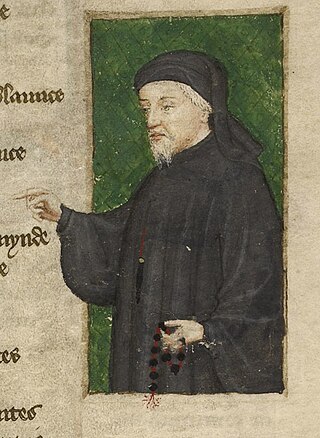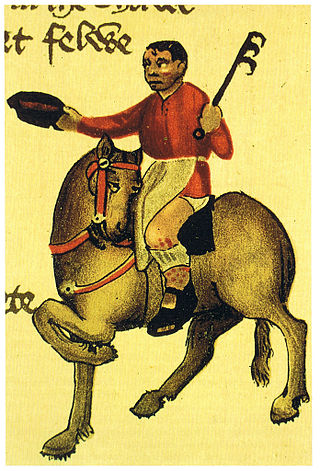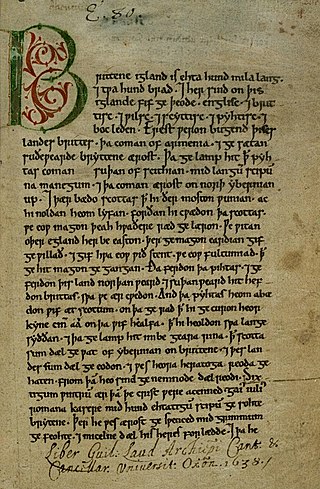Related Research Articles

The Canterbury Tales is a collection of twenty-four stories that runs to over 17,000 lines written in Middle English by Geoffrey Chaucer between 1387 and 1400. It is widely regarded as Chaucer's magnum opus. The tales are presented as part of a story-telling contest by a group of pilgrims as they travel together from London to Canterbury to visit the shrine of Saint Thomas Becket at Canterbury Cathedral. The prize for this contest is a free meal at the Tabard Inn at Southwark on their return.

Geoffrey Chaucer was an English poet, author, and civil servant best known for The Canterbury Tales. He has been called the "father of English literature", or, alternatively, the "father of English poetry". He was the first writer to be buried in what has since come to be called Poets' Corner, in Westminster Abbey. Chaucer also gained fame as a philosopher and astronomer, composing the scientific A Treatise on the Astrolabe for his 10-year-old son, Lewis. He maintained a career in the civil service as a bureaucrat, courtier, diplomat, and member of parliament.

John Gower was an English poet, a contemporary of William Langland and the Pearl Poet, and a personal friend of Geoffrey Chaucer. He is remembered primarily for three major works—the Mirour de l'Omme, Vox Clamantis, and Confessio Amantis—three long poems written in French, Latin, and English respectively, which are united by common moral and political themes.
This article contains information about the literary events and publications of 14th century.

Medieval literature is a broad subject, encompassing essentially all written works available in Europe and beyond during the Middle Ages. The literature of this time was composed of religious writings as well as secular works. Just as in modern literature, it is a complex and rich field of study, from the utterly sacred to the exuberantly profane, touching all points in between. Works of literature are often grouped by place of origin, language, and genre.

"The Cook's Tale" is one of the Canterbury Tales by Geoffrey Chaucer. It breaks off after 58 lines and was presumably never finished, although some scholars argue that Chaucer deliberately left the tale unfinished.

The Ellesmere Chaucer, or Ellesmere Manuscript of the Canterbury Tales, is an early 15th-century illuminated manuscript of Geoffrey Chaucer's Canterbury Tales, owned by the Huntington Library, in San Marino, California. It is considered one of the most significant copies of the Tales.
The Hengwrt Chaucer manuscript is an early-15th-century manuscript of the Canterbury Tales, held in the National Library of Wales, in Aberystwyth. It is an important source for Chaucer's text, and was possibly written by someone with access to an original authorial holograph, now lost.

Thomas Hoccleve or Occleve (1368/69–1426) was a key figure in 15th-century Middle English literature, significant for promoting Chaucer as "the father of English literature", and as a poet in his own right. His poetry, especially his longest work, the didactic work Regement of Princes, was extremely popular in the fifteenth century, but went largely ignored until the late twentieth century, when it was re-examined by scholars, particularly John Burrow. Today he is most well known for his Series, which includes the earliest autobiographical description of mental illness in English, and for his extensive scribal activity. Three holographs of his poetry have survived, and he also copied literary manuscripts by other writers. As a clerk of the Office of the Privy Seal, he wrote hundreds of documents in French and Latin.
Adam Pinkhurst is best known as a fourteenth-century English scribe whom Linne Mooney identified as the 'personal scribe' of Geoffrey Chaucer, although much recent scholarship has cast doubt on this connection.

The Book of Margery Kempe is a medieval text attributed to Margery Kempe, an English Christian mystic and pilgrim who lived at the turn of the fifteenth century. It details Kempe's life, her travels, her accounts of divine revelation including her visions of interacting with the Trinity, particularly Jesus, as well as other biblical figures. These interactions take place through a strong, mental connection forged between Kempe and said biblical figures. The book is also notable for her claiming to be present at key biblical events such as the Nativity, shown in chapter six of Book I, and the Crucifixion.

The Anglo-Saxon Chronicle is a collection of annals in Old English, chronicling the history of the Anglo-Saxons.

Contact between Geoffrey Chaucer and the Italian humanists Petrarch or Boccaccio has been proposed by scholars for centuries. More recent scholarship tends to discount these earlier speculations because of lack of evidence. As Leonard Koff remarks, the story of their meeting is "a 'tydying' worthy of Chaucer himself".
Siege of Thebes is a 4716-line poem written by John Lydgate between 1420 and 1422. Lydgate composed the Siege of Thebes directly following his composition of Troy Book - which was patronized by King Henry V - and directly preceding his production of The Fall of Princes - which Humphrey Duke of Gloucester patronized during King Henry VI's regency. The poem is particularly significant because it was written without an identifiable patron, and most probably without patron or commission whatsoever. Whatever the status of its patronage, the Siege of Thebes still managed to gain significant popularity, attested to by its 31 surviving manuscripts. The poem is, in large part, a response to Geoffrey Chaucer's The Canterbury Tales. Lydgate's poem borrows The Canterbury Tales' pilgrimage-based framing device and is written as an additional tale in the cycle. However, unlike Chaucer, Lydgate establishes himself as the narrator of the work, and recounts the siege of Thebes. Lydgate's Siege of Thebes follows and expands upon the Theban Cycle, but makes significant additions to the source materials.
The Prologue and Tale of Beryn are spurious fifteenth century additions to Geoffrey Chaucer's Canterbury Tales. They are both written in Middle English.
Harley MS 7334, sometimes known as the Harley Manuscript, is a mediaeval manuscript of Chaucer's Canterbury Tales held in the Harleian Collection of the British Library.
The Trinity Gower D Scribe, often referred to simply as Scribe D, was a professional scribe and copyist of literary manuscripts active during the late fourteenth and early fifteenth century in London, England. Although his real name long remained unknown, Scribe D has been described as "so well known to students of late Middle English manuscripts that he hardly needs any introduction".
Malcolm Beckwith Parkes, credited as an author as M. B. Parkes, was an English paleographer, notable for his contributions to the scholarship of medieval manuscripts. His studies of the manuscripts of Geoffrey Chaucer and William Langland were especially important, and his 1978 article "The Production of Copies of the 'Canterbury Tales'" was described as "seminal".
Emeritus Professor Phyllis Hodgson (1909–2000) was a Medievalist and translator of medieval texts.
Norman Francis Blake was a British academic and scholar specialising in Middle English and Early Modern English language and literature on which he published abundantly during his career.
References
- ↑ Frost, Ruth. 2016. A brief note on geoffrey spirleng, co-scribe of MS hunter 197 (U.1.1), and his compilation of the old free book of norwich, NRO, NCR case 17c. Journal of the Early Book Society for the Study of Manuscripts and Printing History 19, : 241-248
- ↑ "Chaucer and his works". www.gla.ac.uk. Retrieved 2024-08-13.
- ↑ "English Language: literary manuscripts". www.gla.ac.uk. Retrieved 2024-08-13.
